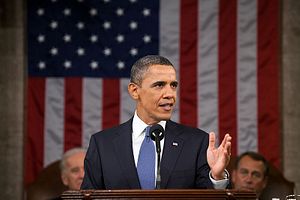Yesterday, U.S. President Barack Obama gave the traditional State of the Union address, wherein he laid out his vision for U.S. policy in the next year (a transcript can be found here). Such speeches are intended for a domestic audience (although they are also scrutinized all over the world) and typically focus more on domestic issues. Still, as Dan Lamothe at Foreign Policy wrote, this year Obama’s State of the Union speech “was notable for how little time he devoted to foreign policy — and how little he said that amounted to anything new.”
What Obama Did Say
It was obvious that, as pundits had predicted, Obama’s main focus was on his success rebuilding the US economy, and his plan to continue doing so. He spent the bulk of his speech laying out his “proposals to speed up growth, strengthen the middle class and build new ladders of opportunity into the middle class.”
Accordingly, Obama’s few mentions of China were economic in nature. As usual, China mostly featured in Obama’s speech (along with Europe) as a competitor that should push the U.S. to make necessary reforms. “China and Europe aren’t standing on the sidelines, and neither should we,” Obama said at one point, arguing for additional money to fund research and innovation. The use of China as a measure of comparison didn’t go unnoticed by Chinese media. South China Morning Post made the lede of their article Obama’s “bold” declaration that “for the first time in over a decade, business leaders around the world have declared that China is no longer the world’s number one place to invest; America is.”
When Obama did talk about foreign policy, his focus was on the broader Middle East. With regards to Afghanistan, he spoke proudly of the fact that “we will complete our mission there by the end of this year, and America’s longest war will finally be over.” There was little discussion of the uncertainties regarding the future of U.S. troops in the country, a topic my colleague Ankit has covered numerous times. Obama promised to continuing working to combat terrorism “in Yemen, Somalia, Iraq, [and] Mali” and made a vague promise to ”support the opposition” in Syria. Finally, he praised the role of “American diplomacy” in reaching agreements over Syria’s chemical weapons stockpile and Iran’s nuclear program, in addition to U.S. efforts to mediate Israel-Palestine talks. Europe and the Asia-Pacific were granted a mere paragraph apiece.
What Obama Didn’t Say
As with many speeches, what Obama didn’t talk about is just as important as what he actually said. By avoiding or ignoring issues, Obama sent a message about his administration’s priorities for the upcoming year. For those who support increased U.S. engagement in the Asia-Pacific, the message wasn’t pretty.
With all Obama’s focus on the U.S. economy, it was a perfect time for him to make a high-profile push for the Trans-Pacific Partnership (TPP), especially given foot-dragging in Congress over granting the necessary trade promotion authority to move the pact along. Yet the TPP was notably absent from Obama’s address, other than a quick, throw-away mention of “new trade partnerships with Europe and the Asia-Pacific” being able to create new jobs. As TPP negotiations reach the final, critical stage, public support from Obama in his most widely covered speech of the year would have been extremely valuable. That he couldn’t make room for even a sentence in his speech speaks volumes.
In broader terms, Obama missed a clear opportunity to restate one of his signature foreign policy initiatives, the U.S. “rebalance” (previously dubbed the “pivot”) to Asia. The Trans-Pacific Partnership was seen as an important economic aspect of the rebalance; its absence from the State of Union reflected the speech’s neglect of the whole region. There was no mention of the rebalance, just a general promise to “continue to focus on the Asia-Pacific, where we support our allies, shape a future of greater security and prosperity and extend a hand to those devastated by disaster.” Obama flubbed the chance to clearly articulate his vision for the United States’ role — economic, diplomatic, and military — in the region, an issue that still causes a great deal of head-scratching across the globe.
By neglecting to mention any of the on-going issues in the Asia-Pacific, from the dangerous tensions between China and Japan to larger concerns over maritime disputes and the potential for an arms race, Obama sent a signal. Whether purposeful or not, his neglect of these issues in the State of Union brings the rebalance to Asia into question. There have already been mounting questions over whether or not the U.S. will remain committed to the region despite budget cuts. Obama’s speech, with its foreign policy vision monopolized by the Middle East, Iran, and Afghanistan, only lends credence to those who believe the U.S. will devote its resources elsewhere.
The Brookings Institution, an influential DC thinktank, recently released its annual set of policy recommendations for the president. The recommendations for Asia policy, penned by Jonathan Pollack and Jeffrey Bader, suggested four steps: ensuring that budget cuts don’t affect the U.S. rebalance to Asia, completing the TPP negotiations, encouraging China’s economic reforms, and nudging U.S. allies (especially Japan and South Korea) to take steps to promote regional security. Pollack and Bader concluded that “strengthening the administration’s commitment to the Asia-Pacific region is a welcome and necessary development.”
Apparently Obama missed the memo. Not one of these policy initiatives — which mesh with similar recommendations from many U.S. Asia watchers — was affirmed (or even mentioned directly) during the speech. Through what he said, and what he neglected to say, Obama’s State of the Union gave more ammunition to those who say the rebalance is dead.

































